SPECIAL
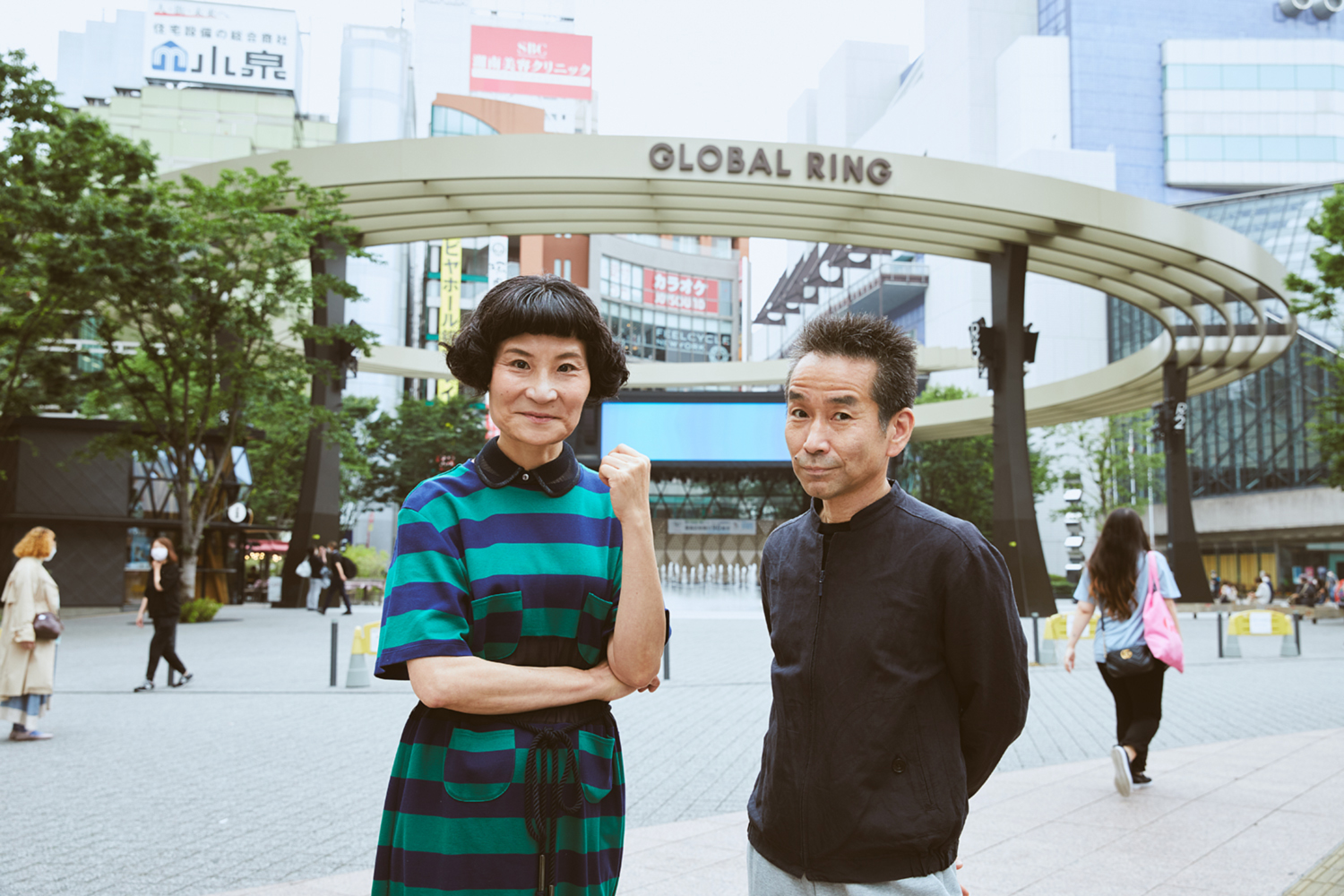
Outdoor TheatrePerformance “Wuthering Heights” Shuji Onodera ×Hairi Katagiri interview(Part 2)
A wind from England’s wild and lonely moors blows into IkebukuroWhat transpires is no mere love story...(Part 2)
The Outdoor Theatre Performance “Wuthering Heights,” part of the 2022 Tokyo Festival main program, will be directed by Company Derashinera leader Shuji Onodera, who sees a series of recent natural phenomena as intersecting with the story of “Wuthering Heights.” Teaming up with Onodera for this production is his friend and collaborator for the past decade, actor Hairi Katagiri.
In Part I we heard about their relationship and the narrative of “Wuthering Heights.” In Part II we hear about our guests’ expectations for the rare performing environment of an outdoor production, the “Onodera theatre” -style direction for “Wuthering Heights,” and the pleasures of theatregoing.
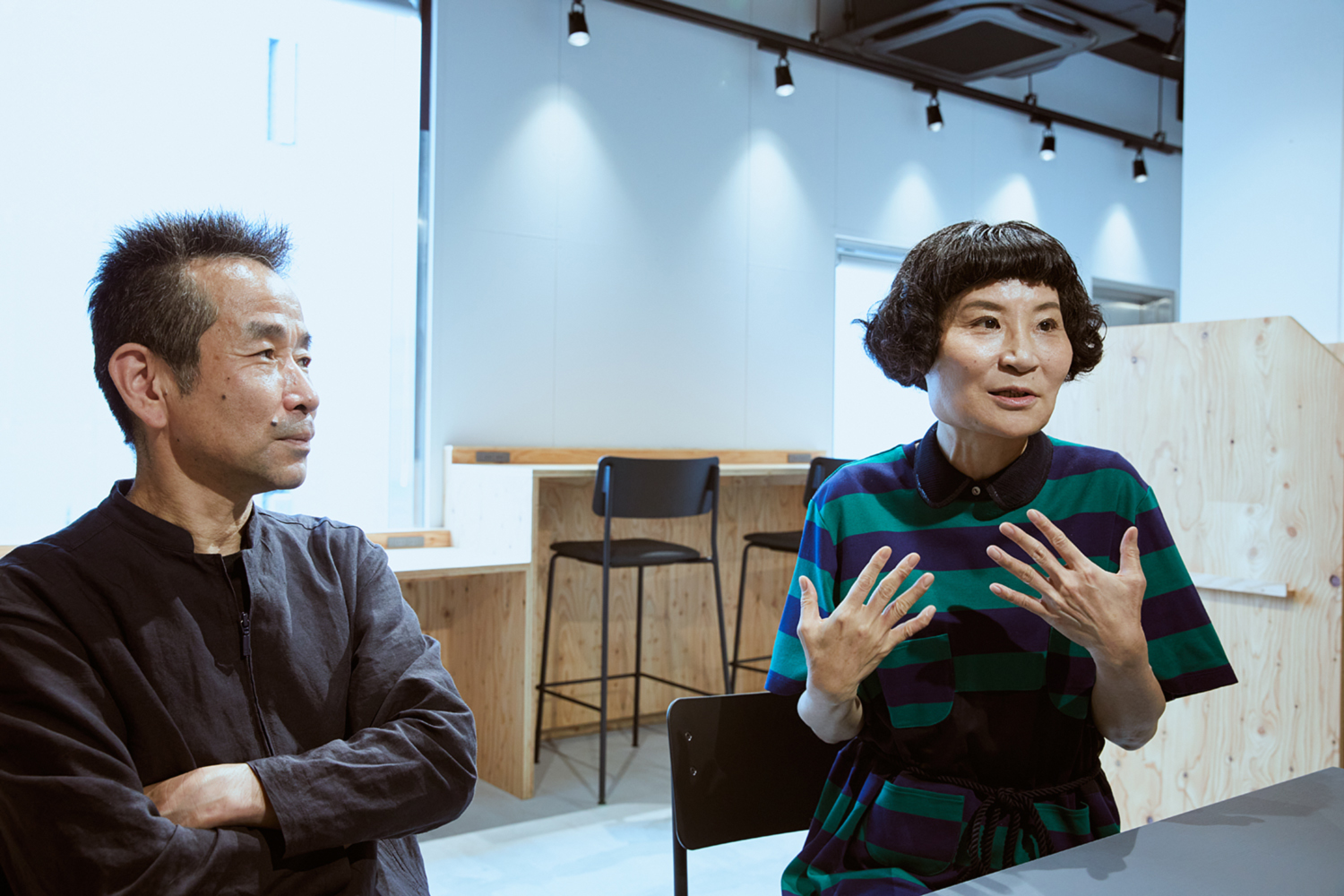
Performing outside - creative expression in Ikebukuro’s unconstrained outdoors
- Unlike the usual indoor performance, this will be an unconventional outdoor performance. Is there anything you are looking forward to or expecting?
Onodera: I think it’s going to be really thrilling. I mean, everyday life that has nothing to do with the story will be going on right next to the stage. But since it’s very difficult to use that to your advantage, it'll be like finding out our inadequacies with that in our heads. All we can do is our best.
- Accepting that there will be inconsistencies in the plan, and just doing your best.
Onodera: But having said that, I hope everyone involved including Hairi-san will enjoy the experience. We don’t usually get to experience theatre in an unprotected environment, so I hope it will be a positive stimulus. In terms of the audience too, I’ll be happy if they aren’t bound by preconceptions of what theatre is like, and if they just pass by, for some reason watch the performance, and feel pleased they found out about it; because we ourselves really want to encounter new audience members who haven't had much contact with this kind of artistic expression until now. In fact, it would be like a dream if people came close to the venue by chance, think"What, Hairi Katagiri is in it?!” and end up watching it and finding they enjoy it. And that's the real thrill of doing theatre outdoors. I don't know to what extent I can make this happen, but I'm looking forward to it.
Katagiri: When I was originally wondering what to do, I thought it was great fun to surprise people walking by, or to sit collecting tickets at the movie theatres with weird make up on my face. I think that was the starting point for my work in theatre.
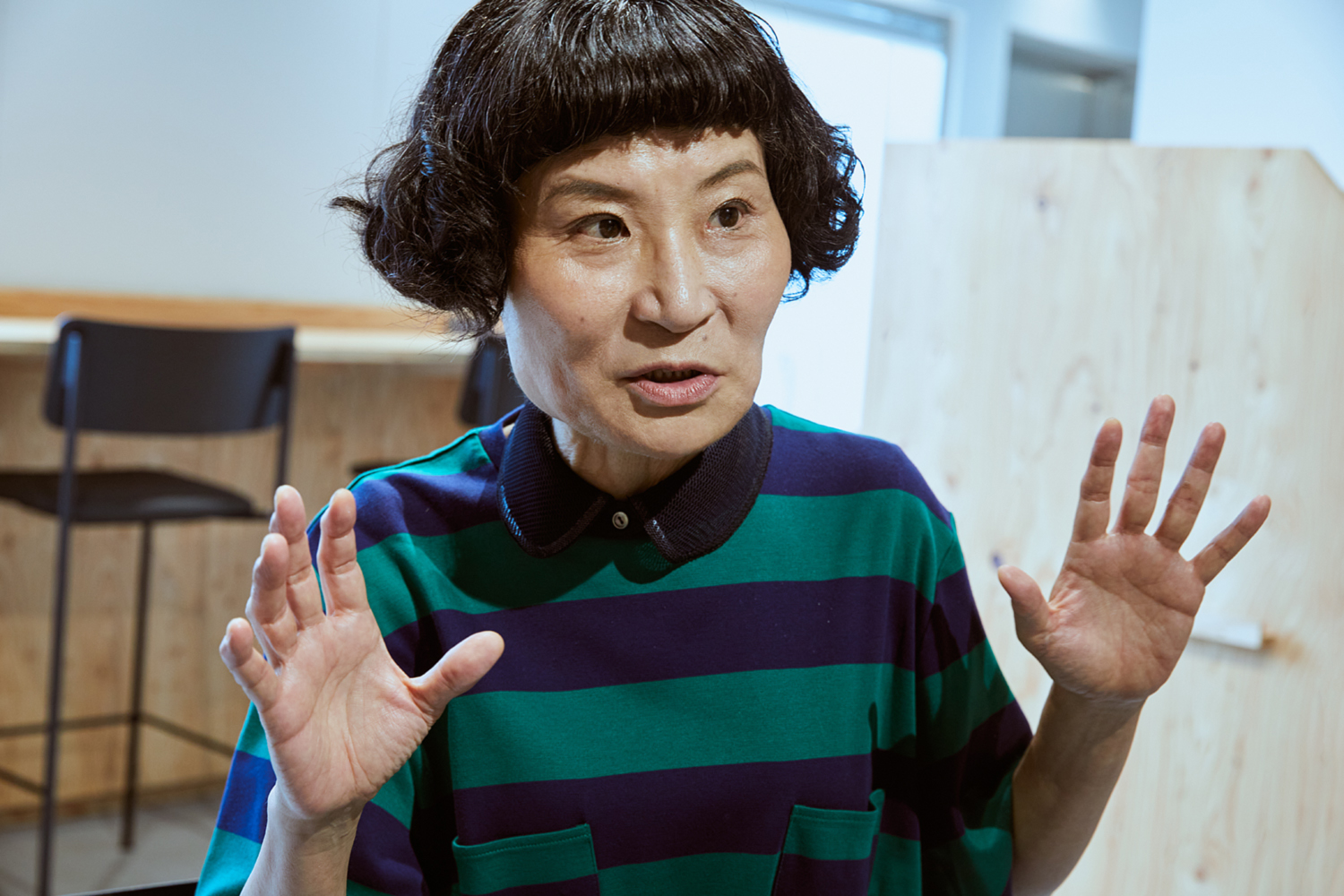
- A slight feeling of incongruity, hidden in everyday life.
Katagiri: Of course, I intended to behave properly for people who had bought a ticket and taken their seats. It was like a desire to be noticed by people who happened to be passing nearby. I think the source of all the energy I have for theatre is the way people passed by and did a double-take. That's why I think that this production might be telling me to return to my origins; telling me to start over again from zero.
- Returning to your origins.
Katagiri: Before this (the “Wuthering Heights” venue GLOBAL RING THEATRE and the Tokyo Metropolitan Theatre) was built, when it was originally a park, we put on a stylish play in front of people who had lived in this place for a long time. There were so many people there watching the play in a disorderly fashion, jeering and heckling, coming into the tent we had set up, not really sure what the situation was with entrance fees. Never the less, somehow everyone had a good time. I have memories of that time. That’s how it feels now. Actually I’m thinking of making a presentation to Onodera-san, because I’m wondering if I can get him to think of me like a person who lived in this outdoor space. In this way,I think I can take part in the production feeling like I’m one of the people who live here.
The aim is a production that appears and disappears like a mirage.
Is it fact, or fiction?
- In pre-rehearsals, multiple cast members were assigned to play one of the characters in the story. I don’t expect you to tell us everything but will there be a twist like this in the actual production?
Onodera: When Satoshi Miyagi directs, his style is to use two people –a “mover” and a “speaker” -for one role, so keeping that in mind, I think it would be good to have different people, someone who speaks and someone who moves; neither do I believe the same actor has to play the same role from the start of the story to the end.What’s more, people off stage suddenly start talking to me, and during performances, Hairi-san spends ages talking to non-performers (laughs). I even think it's "natural" to deviate from the rules of stage performance. The more you elaborate on a production, the more artificial it becomes, so how can you avoid elaborating? It’s are petition of continuous doubt as to what I should do to make it right.
- It seems like it’s going to be a production to repel or bewilder.
Onodera: I think it could be interesting for people to wonder what it was, and whether it really happened or not. The performance it self will seem to start and end in a flash. I’d like to bring the place back to normal with nothing left after the production is over. I would really like to be able to create layers of different possibilities. As far as Hairi-san is concerned, and it came up earlier, I really want her to play an ambiguous figure who could be inside or outside of the story. She’s an actor who is capable of ambiguity. I think her audience has a certain expectation of her acting style but they would be okay with ambiguity.
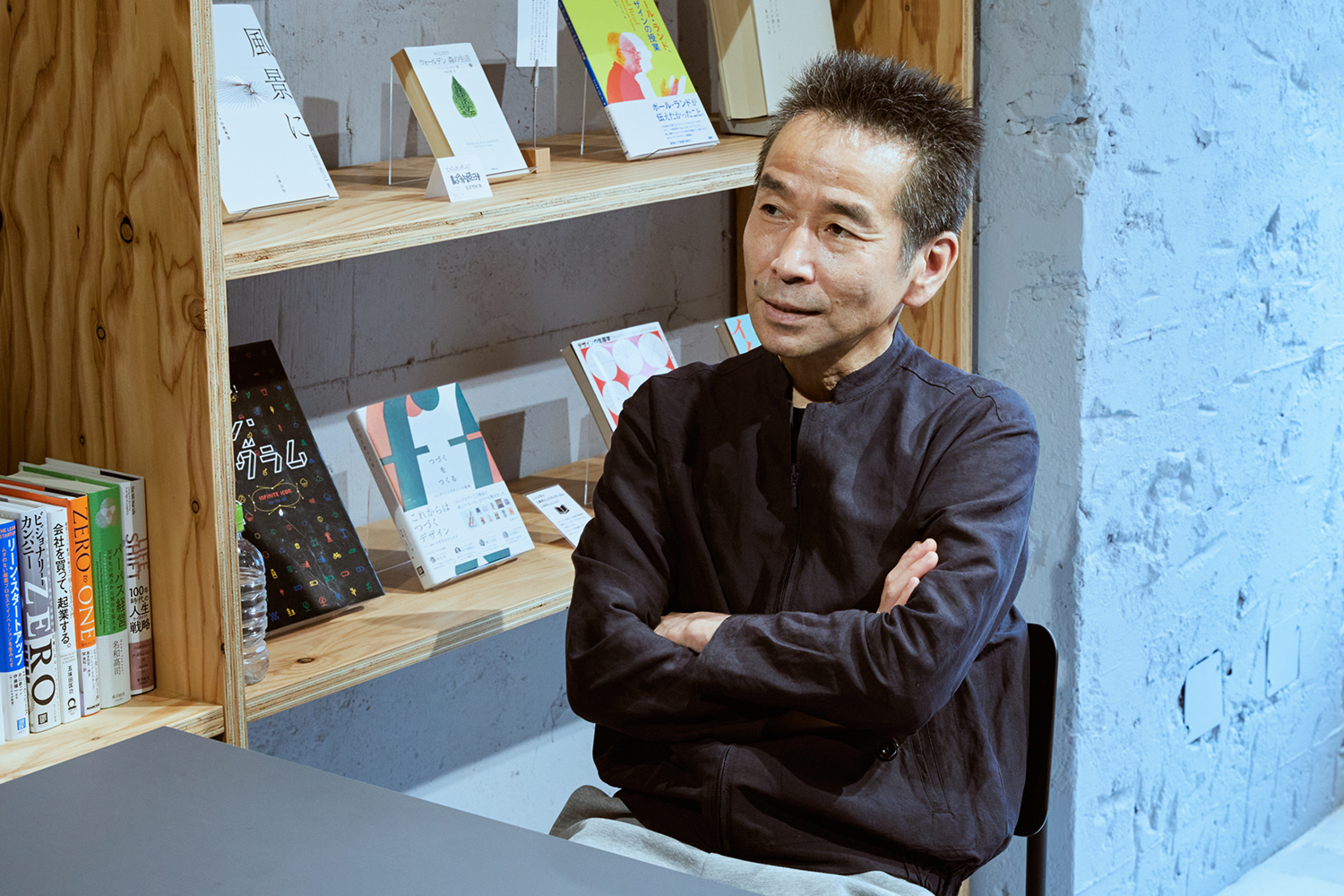
- I wonder what will happen. I’m looking forward to seeing how what you have in your head becomes a reality, Onodera-san.
Onodera: Theatre is an arena where you can come up with ways of thinking that you wouldn't otherwise have thought of, where you can really feel things are possible.That's why experiencing different things visually and listening to something through dialogue somehow puts you in touch with the prejudices, thoughts and ideas inside of you. I think theatre might make people reconsider things. It's something that actually progresses by people moving, so it's different from reading a book; it's really..how can I put it..it’s something you accept and take in, not something you think about with your head. I won’t go into whether I'm able to do this(laughs). But that’s what I feel, so I hope people will watch and react with a feeling of intimacy.
Katagiri: I think Onodera-san's productions are fun and exciting for children to watch as well. Also, it's interesting that the things Onodera-san chooses to stage never really make sense to people. What you offer, Onodera-san, is performance, not outdoor plays or theatre. In that sense it is very enjoyable to watch. After all I’m not really interested in lines.
Onodera: No, no, really...(laughs).
Katagiri: Even in movies, I'll make a gesture of sorts when I cry. I’ve never thought I was particularly good at lines. That's why when you think about it, movement is important; in that space (people) come together, the air moves, atmosphere is created and transmitted to the audience. I think there is more to absorb through the same air than what you can convey through lines.
(Photographs: Ayako Masunaga/ Interview: Hiroyuki Funayose/ Words: Yuria Koizumi)
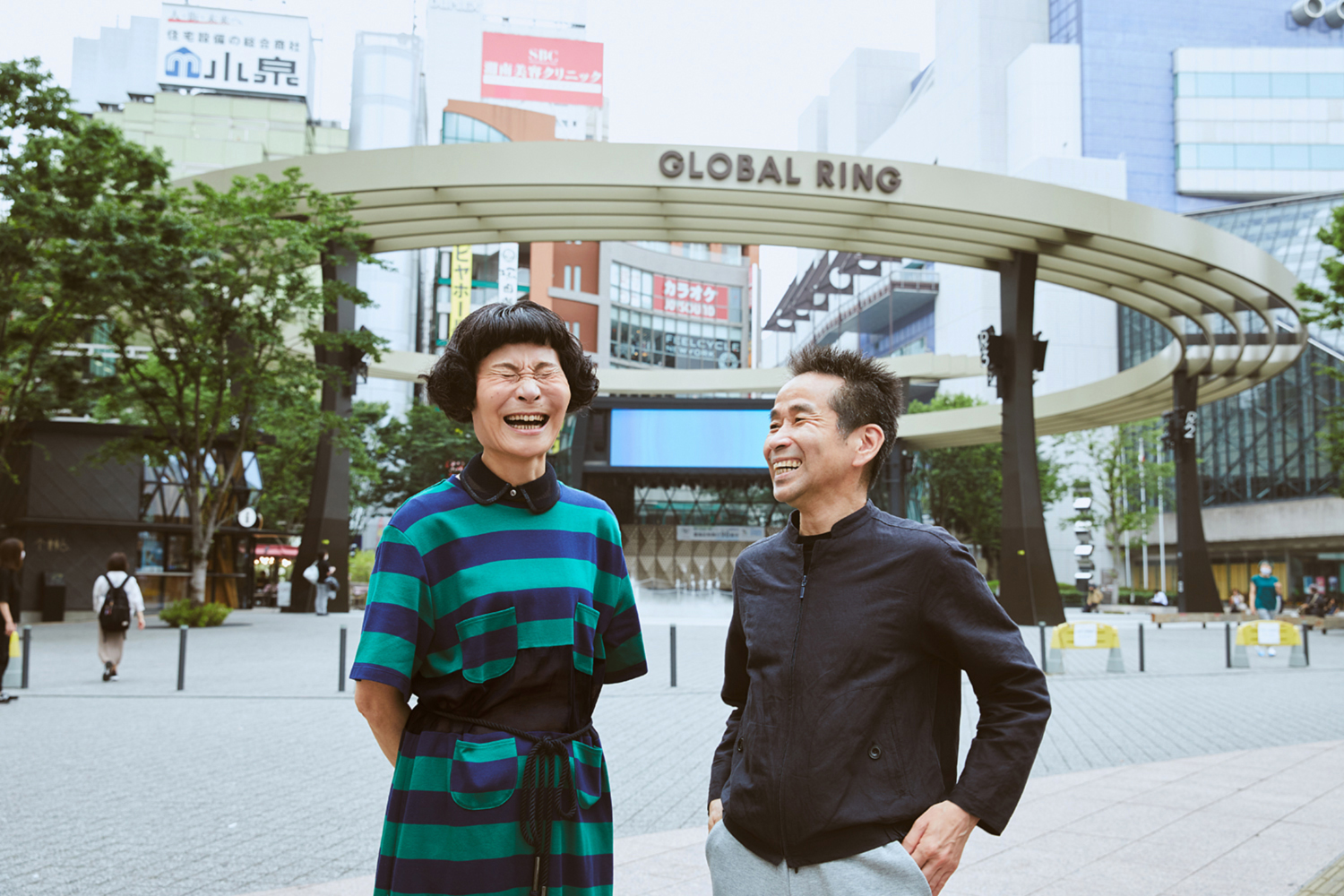
Shuji Onodera
Director, Leader of Company Derashinera. Studied at the Japan Mime Studio. From 1995 to 2006 he was a key member of the mime-based troupe Mizuto Abura.
Afterwards he went to France to study under the Program of Overseas Study for Upcoming Artists offered by the Agency forCultural Affairs, launching Company Derashinera upon his return to Japan. He has attracted attention for his distinctive directing based on mime movement. Onodera’s major directorial works include the Contemporary Noh Theatre Series IX “Taketori” (2018, Theatre Tram, other venues); the international coproduction “TOGE” (2021, Kanagawa Arts Theatre); and “Alice in Wonderland” (2017 /2022, New National Theatre, Tokyo, other venues). He actively engages in performance projects outside the theatre, such as outdoor performances and school tours. He also choregraphs for musicals and plays, and won the 18th Yomiuri Theatre Award Outstanding Staff Award. He was appointedJapan Cultural Envoy by The Agency for Cultural Affairs in 2015. He also handled choreography for Tokugawa Ieyasu played by Kinya Kitaoji in the 2021 NHK historical drama television series “Reach Beyond the Blue Sky” (Seiten o Tsuke).
Hairi Katagiri
Actor, born in Tokyo in 1963. While at university she made her stage debut as part of a theatre troupe while working part time as a ticket collector in a movie theatre. She has subsequently worked on a wide variety of project including commercials, movies and television drama. Principal stage and screen apperances include “Miren no yurei to kaibutsu –zaha to tsuruga” (“Unfulfilled Ghost and Monster –“Zaha”and" “Tsuruga””) (2021, written and directed by Toshiki Okada); "The Large Crow (Glass), Even" or "Duchamp's Glass"(2016, written by Juichiro Takeuchi/ directed by Shuji Onodera); “Kirei 〜The Woman Who Met Up With God” (2005, direction and script by MatsuoSuzuki); “Oil” (2003, direction and script by Hideki Noda); “Oh Brother, Oh Sister!” stage and screen versions (2013, 2014); the movie “Hold Me Back”(2020); the movie “Kamome Diner (2006); the TV drama “Chimu-Dondon”(2022); the TV drama “Ama Chan”(2013); the TV drama “Suika”(2003) and many more. She also writes, and has authored the books “Watashi no Matoka” and “Guatemala no Ototo” (Gentosha). Her book of essays demonstrating her love of cinema “Mogiri yo konya mo arigatou”(Kinema Junpo) won her the 82nd Kinema Junpo Best Ten Reader Award.
Outdoor Theater Performance “Wuthering Heights”
By Emily Brontë, Directed by Shuji OnoderaTranslated by Takeshi Onodera “Wuthering Heights” Parts I and II (Kobunsha New Translations of Classicsseries) Cast: Takashi Oshita, Kae Kubo, Yu Saito, Rina Sakiyama, Kotone Suginami, Ren Takeuchi, Musashi Tanno, Ami Chong, Aki Tsujita, Koichiro Tomioka, Sayaka Nakamura, TomaNishiyama, Mutsumi Hanawa, Kyoko Miyashita, Hairi Katagiri
Period: Monday, Oct. 17 –Wednesday, Oct. 26, 2022
GLOBAL RING THEATRE (Ikebukuro Nishi-guchi Park Outdoor Theatre)
Tickets on sale from Saturday, Sept. 10 from 10:00 a.m.
Ticket prices: All seats unreserved (tax included)/Front: ¥500, Back : ¥100
Program/ticket details: https://tokyo-festival.jp/2022/en/program/arashigaoka




